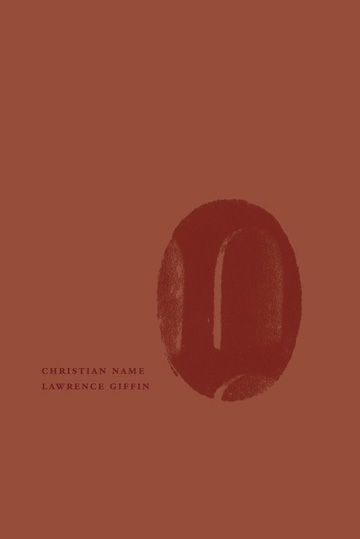 Lawrence Giffin
Lawrence Giffin
Ugly Duckling Presse ($16)
by Stephen Burt
Disturbing and bitter, haunting and at times bizarre, Lawrence Giffin’s collection of sequences and stand-alone poems can look like “theory,” or like collage, but it’s far more: Giffin uses his own dry articulations along with his sources (stories about feral children, the story of Jesus, “theory,” the Grateful Dead) to ask the largest possible questions about how we know what we know, whether we know anything, whether we are just patterns etched into the hard grooves of family life, and why—if we are only patterns, nothing but useless codes—we can feel so alone.
Giffin’s rough, arid poems describe their own goals often: one shows “how a tongue / decomposed in apostrophe / lashes out against truth.” He often turns his caustic tone on stories about children and parents, all of whom (for him) seem ready to abandon one another, as if in disgust at the failure of language to mean: how can I love you (the lines say), or love anyone, or protect you, if all I can say is a paste-up of habits and memes?
Sometimes he seems to be satirizing psychoanalysis, or taking flamethrowers to parenting advice: “More and more fathers are becoming aware of their influence / and regularly dating their daughters.” At other times he seems to be rejecting Christianity and all stories about redemption that derive from it: “My other god’s an atheist . . . / whose back is turned to us.” His longest poem rewrites the Gospels, in tiny verse segments, as the story of a disturbed, and educationally accelerated, Nebraska child who takes his own life: his mother explains his death as like the Crucifixion, a sacrifice on behalf of all other kids, which—though absurd—means that “the suicide appeared / now to be something they had / the vocabulary to understand.”
Giffin takes his cadence and verbal textures, often, from the cerebral, anti-representational sounds of the Cambridge School (John Wilkinson, J. H. Prynne), even when what Giffin says ends up far from opaque: one poem begins “You get nothing.” His forcefully abstract style, its “discarded bits / pulled apart by shear and / torque of intimacy’s involution,” admit the possibility that no vocabulary can help us understand one another much, because there’s not enough to be understood. If you look for “meaning,” Giffin says (in a poem called “Enchanted Whatever”), “a gesture appears with no end in sight.”
Giffin can also be sarcastic, or simply funny (in this he resembles Graham Foust), especially when he is attacking happy talk: “Today is a gift. You / know how you can tell? / It’s got your name written on it / in your handwriting. It reads ‘Equipment.’” But he can be serious at the same time, and not only when he is writing about damaged children. The poems are a kind of non serviam to social pressures (within the poetry world and far outside) that insist that literature should help us, that it should send messages, or carry morals, or do useful work, or celebrate the soul: Giffin writes instead about the unimprovability of everything, suggesting that feral children, and uncommunicative adults, are not so different from the rest of us, “left to want what we are without, / without the word for it.” His difficulties mime that wordlessness.
Do we all get nothing from life, from theory, from advice? Do we get happier, or wiser, after childhood, or through parenthood, or do we just wear ourselves down? Giffin’s poetry suspects the latter: it is a poetry of constant frustration, alleviated by intervals of clarity, like payouts from slot machines. Life may feel like that too, when you step back from it: it may all look like a “chasm / opening up in the center of town,” where there is no town, only “devotion in lieu of practical reason,” attempting “to handle its grief-stricken members.” I may have made Giffin’s creations sound deeply unpleasurable (indeed, he wonders why they give pleasure himself). And yet I have reread it, all the way through, now, four times: in certain moods, it tells, not the truth, but a truth, and I can’t put it down.

